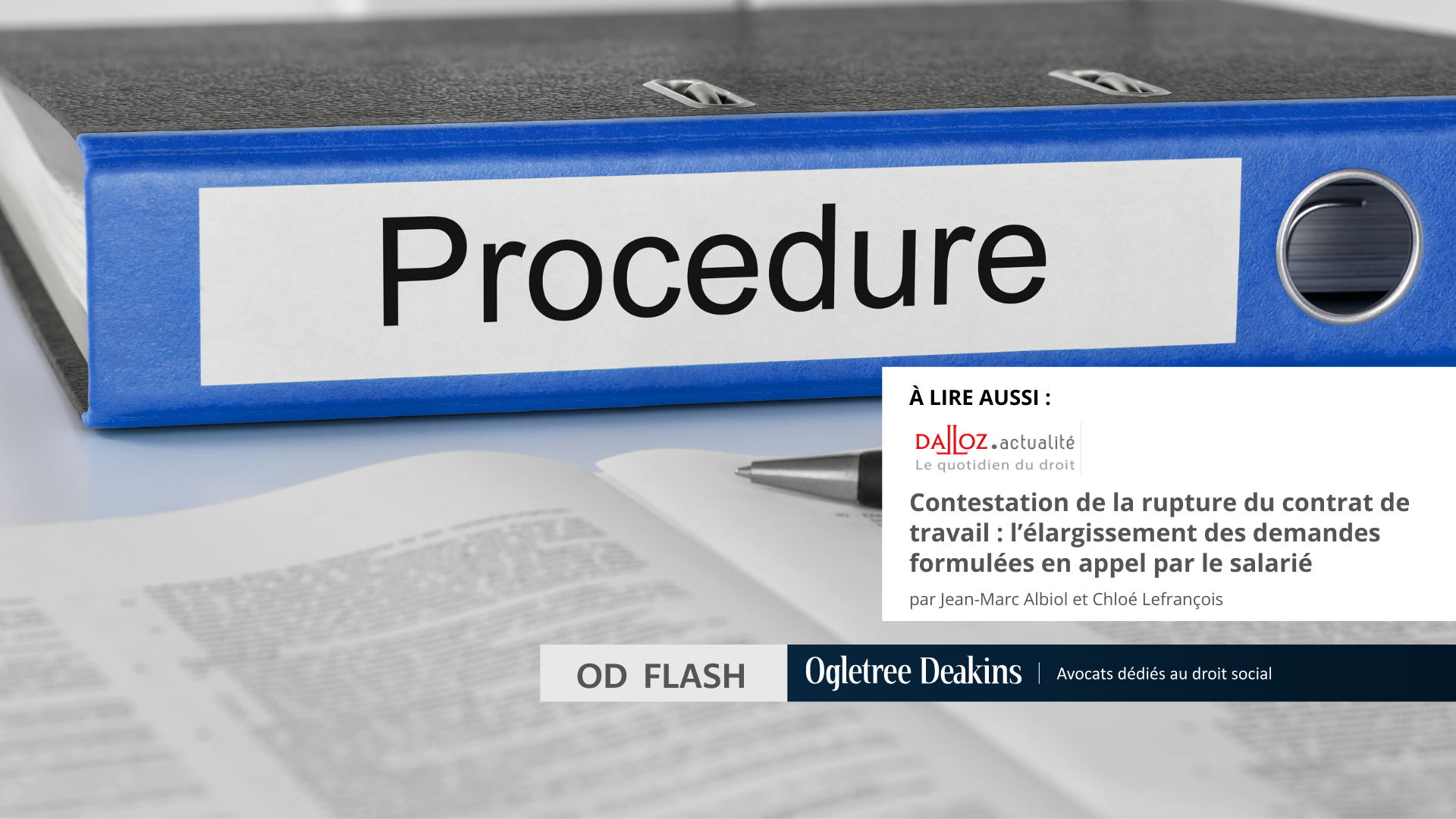
Cass. Soc., 18 septembre 2024, n°22-17.737, FS-B, n°885
As a reminder, the conditions for the admissibility of new claims on appeal were modified by Decree n°2016-660 of May 20, 2016. Thus, pursuant to the new Article 564 of the Code of Civil Procedure, claims made for the first time at the appeal stage are generally inadmissible. However, an exception is provided by Articles 565 to 566 of the same code, which stipulate that claims that pursue the same objectives as those submitted to the first judges are not considered new, or that it is possible to add to the initial claims if they are accessory, a consequence, or a necessary complement.
Furthermore, it is also reiterated, pursuant to Article L.1226-14 of the Labor Code, that the protective rules applicable to victims of workplace accidents or occupational diseases (“AT/MP”) apply as long as the employee’s incapacity, regardless of when it is recognized, is at least partially due to this AT/MP and that the employer was aware of it at the time of dismissal.
The ruling of September 18, 2024, was required to address both the procedural aspect concerning the admissibility of new claims and the substantive aspect regarding the origin of the employee’s incapacity.
In this case, an employee was hired on March 7, 2013, as a caregiver by a home assistance association. She was declared unfit in April 2016 and then dismissed for unfitness and impossibility of reassignment the following month. The employee then took her case to the labor court to contest her dismissal.
An appeal was filed, and the Douai Court of Appeal dismissed all the claims in a ruling dated September 24, 2021. Thus, the applicant lodged a cassation appeal.
She argued that:
- She was admissible to request compensation related to the employer’s failure to fulfill its obligation of safety, as this was not a new claim. In fact, the employee asked the Court of Appeal to recognize that the employer had failed in its safety obligation solely to conclude that her dismissal was without real and serious cause, a claim she had already made at first instance. Therefore, her compensation request made at the appeal stage would merely be a continuation of the one already submitted in first instance;
- The Court of Appeal was wrong to conclude that the incapacity did not have a professional origin based on the fact that it was a result of a common law work stoppage, as it should have independently examined whether the incapacity had at least partially a professional origin, regardless of the position of the CPAM. In this case, it was argued that the professional origin of the incapacity stemmed from a workplace accident the employee suffered in 2015, which had been recognized by the CPAM as a professional risk.
The Social Chamber of the Court of Cassation overturned the appeal ruling and held that:
- Pursuant to Article 565 of the Code of Civil Procedure, the claim for damages made by the employee before the Court of Appeal for compensation for the consequences of her dismissal for incapacity due to the employer’s failure to fulfill its safety obligation aimed “at the same objectives as that submitted to the first judges, which sought to obtain compensation for the termination of the employment contract by the employer for failure to fulfill the reassignment obligation.” This new claim should thus be declared admissible;
- Pursuant to Article L.1226-6 in its version prior to the law of August 8, 2016, and Article L.1226-14 of the Labor Code, the Court of Appeal should have, in justifying its refusal to grant the employee the special dismissal indemnity, independently investigated:
- Whether the incapacity had at least partially originated from a workplace accident or an occupational disease; and
- Whether the employer was aware of this origin at the time of dismissal.
According to the Social Chamber, it is up to the trial judges to carry out this verification.
While the jurisprudential framework concerning new claims in social matters seems to be complete, this is not the case regarding incapacity of “partial” professional origin. The Court of Cassation thus rendered several rulings on September 18, 2024, in an attempt to clarify the issue, but without achieving a true clarification, since in another case of the same day, which was more restrictive or even contradictory, it held that it is not possible for the trial judges to dispute the reality of a workplace accident or occupational disease as the source of incapacity once the CPAM has acknowledged its existence through a non-challenge decision (Cass. soc., September 18, 2024, n°22-22.782).(Cass. soc., 18 sept. 2024, n° 22-22.782).




